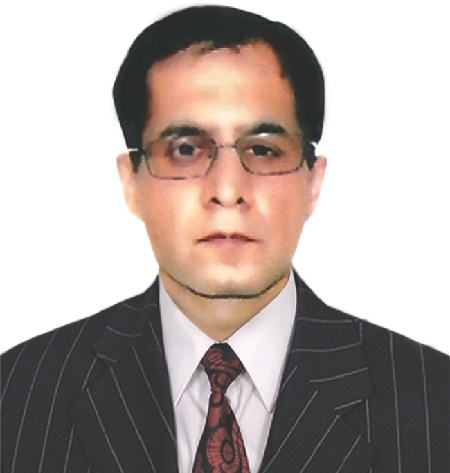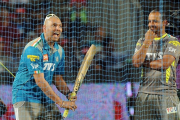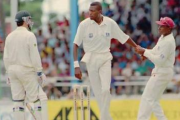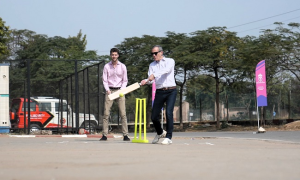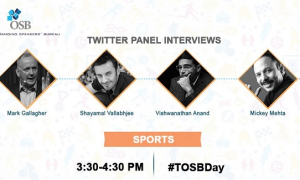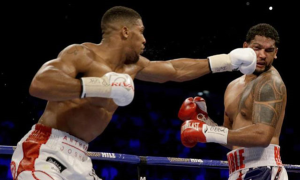When I started playing squash in 1986, I hardly had an idea about what an attractive, mobilizing and inspiring force “Sport” could be. Sport has the power to rescue us from the daily grind of life. A heroic act, a sporting gesture, an impromptu quote, talking tough, looking mean, a brave decision, an affectionate hug – you see them all on the field!! And this is not only about the sporting greats like Sachin Tendulkar or Usain Bolt , but is experienced by anyone who plays a sport regularly. Sport doesn’t build character. It actually reveals it.”
Today sports are a 600 billion dollar industry globally. In India this landscape has never been more exciting. Last year, role models for women were created with the Indian women’s hockey team qualifying for the Olympics after a 36 years gap and Sania Mirza bagging the World No. 1 WTA Doubles ranking. India continued its dominance in South Asia with the highest ever medal tally in the SAG 2016 and winning the South Asian Basketball Championship. Badminton, squash, shooting, archery, chess, billiards, golf, gymnastics and cycling also witnessed some stellar performances individually on the world stage. The inclusive power of sports found expression in the 173 medals that India brought back home from the Special Olympics (intellectual disabilities) held in Los Angeles in 2015. With India doubling its medal projections for Rio, standing out at the Olympics may not be a distant dream. With a robust economic climate and newfound aspiration to etch its place on the globe, India has found a voice to express itself through sports.
Sports unites and hence cannot be confined to only those who take it up as a career. The average Indian who seeks to remain fit in his/her stressful lifestyle or find a forum to voice support for a cause like cancer awareness has turned amateur running into a movement. Companies are taking up sporting competitions within/across organizations to bring together employees isolated due to technology and deadlines. The rising Indian middle class projected to spend 10% of its wallet on education and recreation by 2050 is increasingly seeking non-fictional content backed by a story and sports is fulfilling this demand. “Bharat” is not left behind with rural India backing the popularity of leagues of traditional sports like Kabaddi, Wrestling, Kho Kho and Mallkhamb. And not to forget, ambassadors of conflict resolution of Indo-Pak are none other than the fans rooting to see the arch-rivals play together in a great game of cricket.
Sports in India has traditionally been a government led initiative. Policies like compulsory physical education in schools, higher budgetary allocation and inclusion of community playgrounds in master plans of towns in Manipur have preserved sporting traditions that date back to its erstwhile competing kingdoms. In Haryana, initiatives like Play 4 India that scout for talent in the age group of 8-14 at the grassroots, groom and sponsor them, provide career support in terms of academic scholarships or reservation in government jobs are a stand-out. Not only the individuals but also the village that nurtures sports is awarded monetary support for development. The strengthening of the sports ecosystem in these states has shown commendable results in terms of contribution to national and international games’ medal tally for India.
Times are changing and so is the role of the private sector in revolutionizing sports in the country. Billion-dollar TV rights, millions of viewers across the globe, and consequent ad revenues, ticket and merchandise sales are bringing in money like never before. Indian Premier League in cricket started the trend and soon the Indian Super League in football had become the fourth biggest football league (average stadium attendance of 24,357) in the world , beating the French, Italian and Brazilian leagues. It is noteworthy that all 8 ISL franchises are mandated to invest 2 Cr p.a. for development of football at the grassroots level. . The recent collaboration between Sports Authority of India and Gopichand Badminton Foundation is a welcome move of PPP in sports. Not everything is for profit. Philanthropic funds like Olympic Gold Quest (founded by Geet Sethi and Prakash Padukone) have supported Saina Nehwal and Mary Kom. Tata Group has set the benchmark for CSR in sports by initiatives like Tata Archery Academy (which professionally trained world No. 5 Deepika Kumari) and developing Kati, a popular tribal sport in Jharkhand.
However a lot remains to be done for unleashing the power of sport in the country. Poor governance as seen in the tussle among federations affecting the morale of players, limited reach of Sports Authority of India in scouting players (a mere 0.0035% of the population in the 8-25 age group), lack of industry status for sports, inhibiting private sector investments, limited legacy planning and monetization of sports infrastructure and duty structures making sports equipment unaffordable, need to be addressed as soon as possible. Sponsorships are mostly directed towards well established athletes and that too mostly in team sports that have professional leagues. In spite of bagging 3 golds, 14 silvers and 16 bronzes in the Paralympic Asian Games in S. Korea and more recently 14 medals at the 2016 Dubai IPC Athletics Asia-Oceania, funds still elude the Paralympians.
And finally, it is vital to further drive the culture of sports in our country within the multiple roles we play as individuals’ viz. parents, teachers, mentors, family & friends. We need to take cognizance of how sport shapes character as well as health (more than 20% children in India suffer from obesity). Whether it turns out to be a career choice for the child or not, time and effort needs to be given to explore this. Sports is no longer an alternate career option and isn’t confined to being an athlete. Coaching, sports psychologists, fitness trainers, journalists, commentators and marketing / consulting roles are just some of the whole range of avenues available today.
We are aware of what needs to be fixed. We are aware of where we need to go. As Andre Agassi puts it, the only secret is “to be inspired”.
By: Sanjeev Anand – Country Head, Commercial Banking, IndusInd Bank and an avid sports enthusiast.
Tags: India, Sania Mirza, Sanjeev Anand, Sport, Sporting Nation, Sports, Sports Enthusiast

